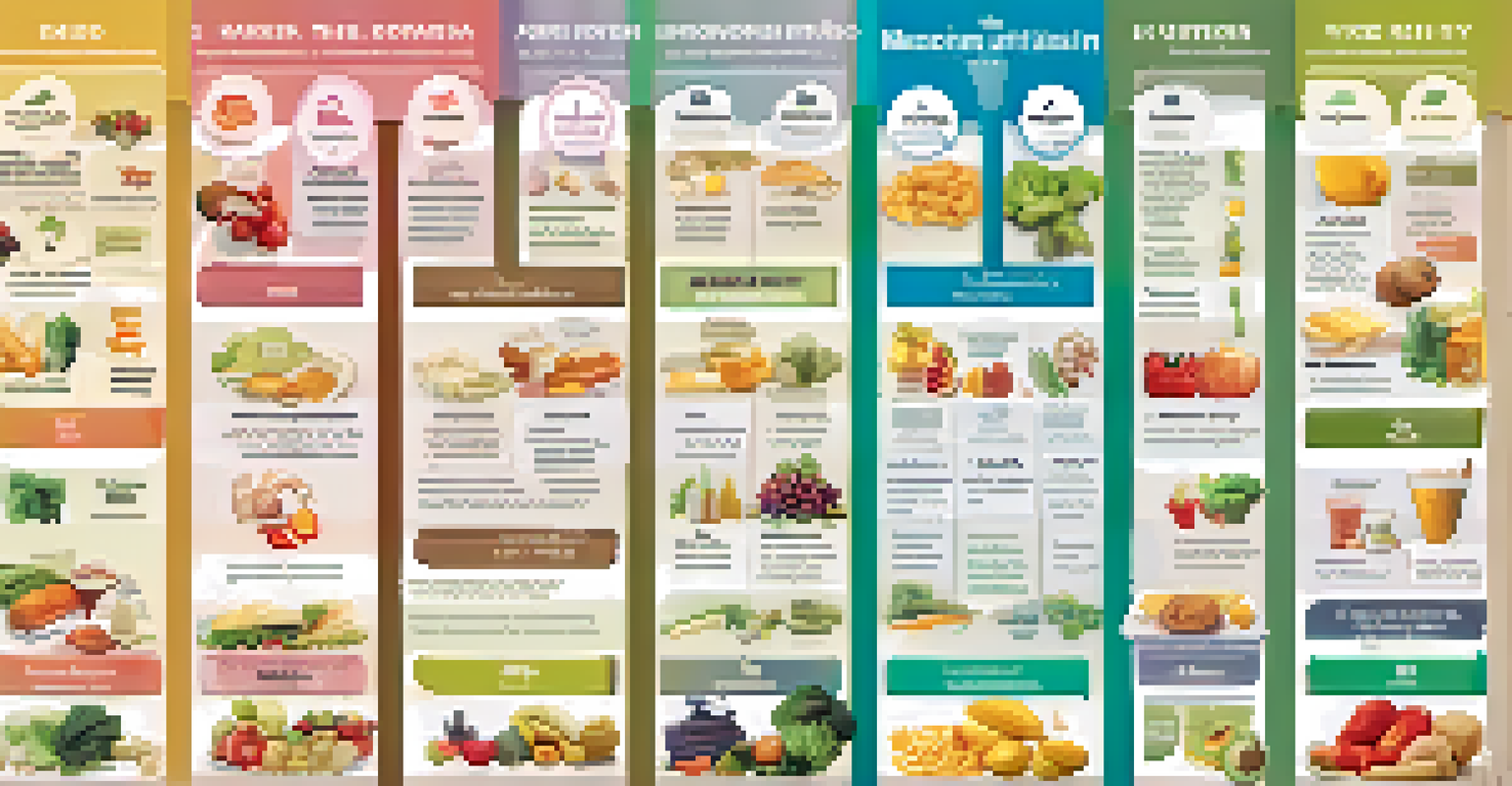Nutrition Education: Empowering Individuals for Better Choices

Understanding the Importance of Nutrition Education
Nutrition education is essential for helping individuals understand the impact of food choices on their health. Just like how learning to drive requires knowledge of traffic rules, making informed dietary choices needs education about nutrition. This foundational knowledge can lead to better health outcomes and a more vibrant lifestyle.
Let food be thy medicine and medicine be thy food.
When people comprehend the basics of nutrition, including macronutrients and micronutrients, they can make choices that fuel their bodies effectively. For example, knowing the difference between complex carbohydrates and simple sugars can help someone decide on healthier snack options. Nutrition education breaks down these concepts into digestible pieces, making it easier for everyone to grasp.
Moreover, nutrition education fosters a sense of empowerment. Instead of feeling overwhelmed by dietary advice and trends, individuals can navigate their choices with confidence. This newfound understanding helps to encourage a proactive approach to health, ultimately leading to improved well-being.
Key Components of Effective Nutrition Education
Effective nutrition education focuses on several key components: information, skills, and motivation. First, it provides accurate information about what constitutes a balanced diet, including the importance of fruits, vegetables, whole grains, and proteins. This can dispel common myths and clarify what healthy eating truly entails.

Next, it teaches practical skills, such as meal planning and label reading, which empower individuals to make informed decisions at the grocery store. For instance, understanding how to interpret food labels can help someone choose products that align with their dietary needs. These skills turn knowledge into action, fostering healthier habits.
Nutrition Education Empowers Choices
Understanding nutrition helps individuals make informed dietary choices, leading to better health outcomes.
Lastly, motivation is crucial in encouraging individuals to implement what they've learned. Engaging stories, relatable examples, and even community support can inspire people to take charge of their nutrition. When individuals feel motivated, they are more likely to embrace healthier eating patterns sustainably.
The Role of Community in Nutrition Education
Community plays a vital role in nutrition education by providing support and resources. Local organizations often host workshops, cooking classes, and informational sessions that bring people together to learn about healthy eating. This communal approach not only fosters learning but also builds connections among participants.
You are what you eat, so don’t be fast, cheap, easy, or fake.
Moreover, community initiatives can address specific dietary needs and cultural preferences. For instance, a local program might focus on traditional foods while incorporating nutrition education, making the learning process culturally relevant and relatable. This tailored approach encourages greater participation and engagement.
Additionally, communities can create environments that promote healthy choices, such as establishing farmers' markets or community gardens. These resources not only provide access to fresh produce but also create a sense of ownership and pride in making healthier choices together.
Utilizing Technology to Enhance Nutrition Education
In today's digital age, technology can significantly enhance nutrition education. With the rise of apps and online resources, individuals can access a wealth of information at their fingertips. For example, meal-planning apps allow users to create balanced menus based on their dietary preferences and nutritional needs.
Social media platforms also serve as powerful tools for spreading awareness about nutrition. Influencers and educators share tips, recipes, and evidence-based information that can inspire followers to make healthier choices. This accessibility makes nutrition education more engaging and relatable for a wider audience.
Community Supports Healthy Eating
Local initiatives foster learning and connection, making nutrition education more engaging and culturally relevant.
Furthermore, online courses and webinars make it easier for people to learn at their own pace. Individuals can explore topics that interest them, from understanding food labels to mastering portion control, all from the comfort of their homes. This flexibility ensures that nutrition education is accessible to everyone, regardless of their busy schedules.
Addressing Common Misconceptions in Nutrition
One of the biggest challenges in nutrition education is addressing common misconceptions. Many people still believe in outdated dietary myths, such as 'carbs are bad' or 'fat makes you gain weight.' By providing accurate information, educators can help clarify these misunderstandings and promote a more balanced view of nutrition.
For instance, explaining the difference between healthy fats, like those found in avocados, and trans fats can help dispel the myth that all fats are harmful. This kind of nuanced understanding fosters a healthier relationship with food, encouraging individuals to enjoy a variety of nutrients.
Moreover, addressing misconceptions helps build trust in nutrition education. When individuals receive clear, evidence-based information, they are more likely to feel confident in their dietary choices. This confidence can lead to lifelong habits that prioritize health and well-being.
The Impact of Nutrition Education on Public Health
Nutrition education has a profound impact on public health by reducing diet-related diseases. When individuals become informed about their dietary choices, they can lower their risk of conditions such as obesity, diabetes, and heart disease. This, in turn, alleviates the burden on healthcare systems and promotes a healthier population overall.
Moreover, public health campaigns that incorporate nutrition education can reach a larger audience. Initiatives like 'Eat Healthy, Be Active' focus on educating communities about the importance of balanced diets and physical activity. These campaigns create awareness and promote healthier lifestyles on a broader scale.
Technology Enhances Nutrition Learning
Digital tools and resources make nutrition education accessible, allowing individuals to learn at their own pace.
As communities become healthier through improved nutrition, this progress can lead to a ripple effect. Healthier individuals contribute to a more productive workforce and lower healthcare costs, enhancing the overall quality of life. This highlights the importance of investing in nutrition education as a cornerstone of public health strategies.
Creating a Personalized Nutrition Education Experience
Personalization is key in nutrition education, as everyone's dietary needs and preferences are unique. Understanding this, effective programs often encourage individuals to assess their habits and set personalized goals. This tailored approach ensures that the education resonates with each person, making it more impactful.
For example, someone with a busy lifestyle may benefit from quick and easy meal prep tips, while another individual may seek guidance on managing specific health conditions through diet. By addressing these unique needs, nutrition education becomes more relevant and actionable.

Additionally, ongoing support and resources can help individuals stay accountable in their nutrition journey. Whether it’s through follow-up workshops, online forums, or one-on-one coaching, having a support system enhances motivation and encourages sustainable changes. This personalized experience can lead to lasting improvements in health and wellness.